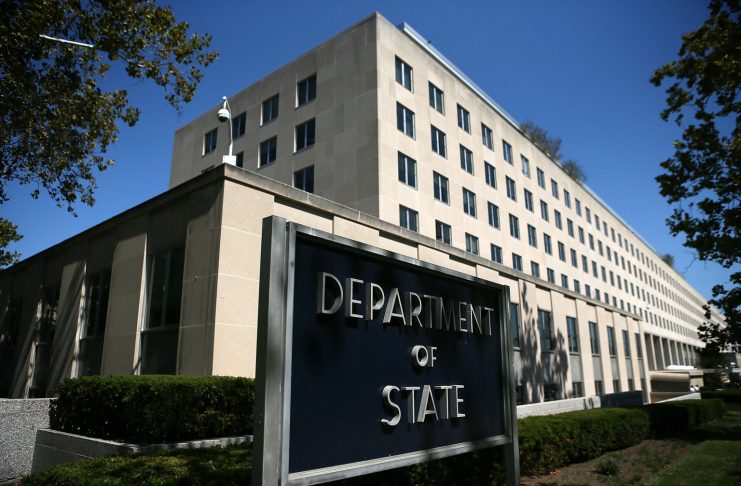The US State Department welcomed the Resolution on Srebrenica adopted by the Parliament of Montenegro.
“The position of the United States on this issue is long-lasting and unwavering. That painful chapter of European history must never be denied or forgotten,” a State Department spokesman said in response to a request from the Voice of America to comment on the adoption of the resolution and the removal of Justice Minister Vladimir Leposavic.
Violent reactions burdened relations between Montenegro and Serbia and the Balkans a day after the Montenegrin parliament adopted a resolution banning the denial of genocide committed in Srebrenica and removing the former justice minister.
Apart from the lively reaction of part of the Montenegrin public, which, although part of the government, is led by the pro-Serbian Democratic Front (DF), critical tones due to the decision made in the highest legislative body of Montenegro come from the highest officials and ministers of Serbia and the Republic of Srpska entity.
Reacting to numerous criticisms, the Prime Minister of Montenegro, Zdravko Krivokapić, said that the DF, together with the Democratic Party of Socialists of President Milo Đukanović, agreed to overthrow the Government and the Parliament of Montenegro.
“In order to call new parliamentary elections. Rest assured that everyone in the government and the parliamentary majority that the DF accuses of treason today is ready to defend your and our victory in the August elections at the cost of their lives. By boycotting the Assembly, the DF has now publicly become part of the parliamentary majority with the DPS,” Krivokapic wrote on Twitter.
He also pointed out that he believes that the Resolution on the genocide in Srebrenica was unnecessary, because, as he said, it deepens divisions and conflicts in society.
“Besides, no such resolution has been adopted in Bosnia and Herzegovina. Montenegro has already adopted the declaration of the European Parliament on the events in Srebrenica,” Krivokapic said.
By the way, in early April, Krivokapić proposed the removal of Minister Leposavić due to the denial that genocide was committed in Srebrenica in July 1995.
DF, one of the factors of the ruling coalition in Montenegro, announced that it does not recognize the Resolution voted in the Montenegrin Parliament on Srebrenica.
As the leaders of that political group, Andrija Mandic and Milan Knezevic, pointed out, the Republic of Srpska and the Serbian people were marked as genocidal. Also, according to their claims, that means the abolition of the Republic of Srpska.
“This document is more shameful for Montenegro than the recognition of the independence of the false state of Kosovo,” it was said at the press conference of Mandic and Knezevic.
In a recorded video address, the President of Serbia, Aleksandar Vučić, assessed the move of the Montenegrin Assembly and the authorities, as he put it, as a decision against the interests of Serbia.
“Citizens of Serbia, people, head up, we will have more resolutions and declarations in the region. “All British resolutions, the Security Council and some other resolutions will be transcribed, and everyone will say that it is not directed against the Serbian people, and it is clear to everyone when they were passed,” Vucic pointed out in a post posted on Instagram.
The current Minister of Police of Serbia, Aleksandar Vulin, went a step further – he asked that those who, as he stated, voted for the Resolution on the genocide in Srebrenica, be banned from entering Serbia.
He marked the members of the Montenegrin parliament who supported the resolution as persons who, as he pointed out, dropped out of the Serbs, without specifying in a written statement what that specifically means.
“An absolutely hostile act,” was Milorad Dodik‘s assertion of the chairman of the presidency of Bosnia and Herzegovina and the representative of the Serb people in that three-member body of Bosnia and Herzegovina.
It should be reminded that international judicial institutions have on several occasions confirmed in their verdicts that genocide was committed against the Bosniak population in Srebrenica.
The International Court of Justice in The Hague, in a 2007 verdict in Bosnia and Herzegovina's lawsuit against the Federal Republic of Yugoslavia (FRY), found Serbia responsible, which – in the court's opinion – did not prevent and punish the crime of genocide in connection with the events in Srebrenica in July 1995. while the same verdict marked the direct perpetrators of the genocide as the army and police of the Republic of Srpska (RS).
Radovan Karadzic, the former president of the Republic of Srpska, was sentenced to life in prison on one count of the 2019 indictment and found guilty of genocide in Srebrenica. In addition, according to a court ruling, he is responsible for persecution, deportations, forcible relocation of the population, extermination and spread of terror as crimes against humanity and violations of the laws or customs of war.
On June 8, Ratko Mladic, a former commander of the Republic of Srpska Army, was sentenced to life in prison for genocide and other crimes during the 1992-1995 war in Bosnia and Herzegovina.
The young man was found guilty of ten counts of indictment – for participation in the genocide in Srebrenica, persecution, extermination, murder, deportation of the population, forced relocation of the population, terrorizing the population, illegal attacks on civilians and taking hostages.
Numerous international actors and states have frequently warned Balkan countries not to deny or relativize final court rulings.
In March 2010, the Serbian Parliament adopted a Declaration condemning the Srebrenica crimes.
The declaration, proposed by the then ruling coalition led by the Democratic Party, refers to a ruling by the International Court of Justice that genocide was committed in Srebrenica in July 1995, and the text condemns the crime in the manner determined by the court's ruling, without mentioning the term genocide.
